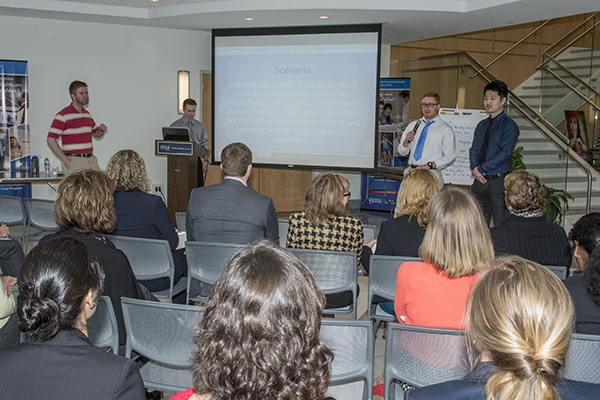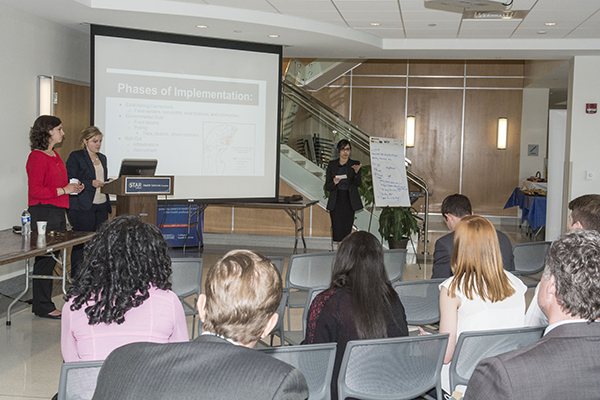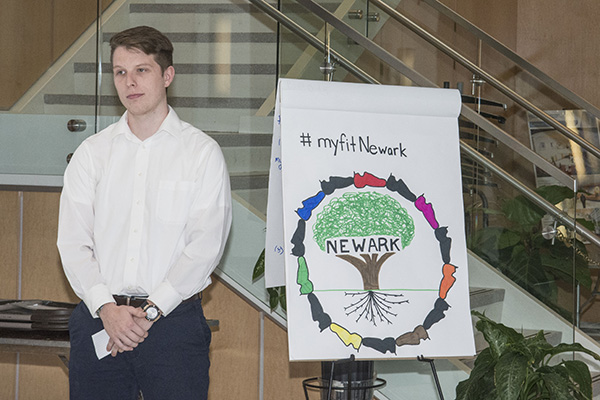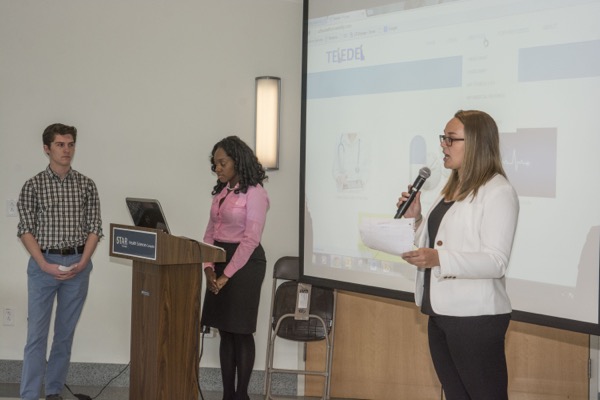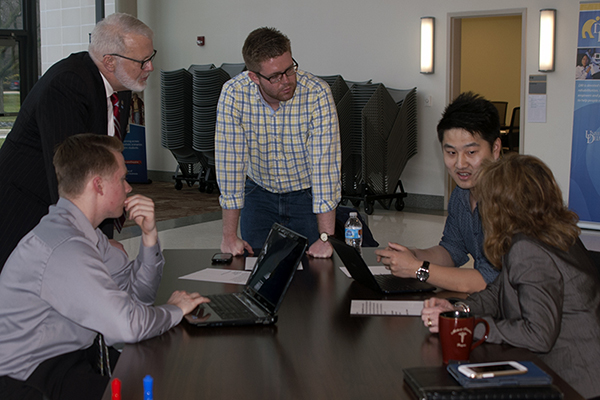

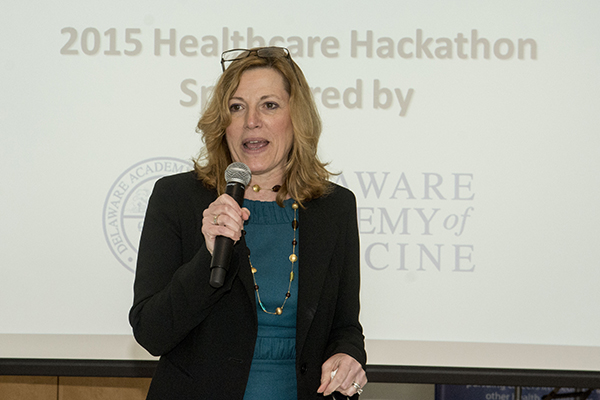
Healthcare Hackathon
Projects address first response, food insecurity, community health, telehealth
10:23 a.m., April 16, 2015--An ambulance pulls up to a tiny bungalow, lights flashing and siren screaming.
Inside is an 83-year-old woman who is in and out of consciousness, suffering from dementia and a host of chronic health conditions.
Campus Stories
From graduates, faculty
Doctoral hooding
The first EMT to reach her quickly realizes that she will be unable to provide a coherent medical history, so he grabs his cell phone and swipes it against a plastic bracelet on her wrist. Within seconds, he has the information he needs to get the woman stabilized, and he has a medical history to share with the triage nurse at the hospital.
The technology is the brainchild of four University of Delaware students who participated in a Healthcare Hackathon hosted by the College of Health Sciences last week. Although still in the conceptual stage, Memento caught the attention of the judges, who awarded it first place in the competition.
“When first responders arrive on scene, they’re not only required to provide high-performance patient care but also burdened with relevant data collection,” says team member Sean Carey, a marketing major and entrepreneurial studies minor.
“The current pen-and-paper method of querying patient information is time consuming and inefficient, and it distracts from a responder’s top priority: rendering the best possible patient care.”
Scott Eisenhart, an honors student in UD’s 4+1 bachelor of arts/master of public administration program, points out that Memento would be especially valuable in medical emergency cases where communication can be challenging, including not only for people who have dementia but also those with autism, diabetes, epilepsy or heart disease.
The team proposed pilot testing the technology, which would be compatible with all of the major mobile device and computer platforms, through New Castle County Emergency Services. Other potential partners range from hospital emergency rooms to insurance providers.
“In addition to optimizing the EMT’s time, Memento would help in congestion control and save triage nurses and physicians time,” says co-developer Matt Paul, a computer science major and an EMT himself. “Instantly having the correct information will enable them to make better decisions.”
“All of the groups proposed thoughtful, innovative approaches to their problems,” says Sarah LaFave, program coordinator in the College of Health Sciences. “We’re amazed at how far they came in just 12 hours.”
The students convened in the Health Sciences Complex at UD’s Science, Technology and Advanced Research (STAR) Campus on Thursday afternoon, worked through the night, and presented their projects at noon on Friday to a diverse audience that included state agency officials and legislators, physicians from Christiana Care, representatives of state medical organizations, and UD faculty and staff.
“We’re really grateful to the Delaware Academy of Medicine for sponsoring the Hackathon and to the many mentors who worked with the student teams to develop their ideas,” says Mike Smith, director of strategic initiatives and partnerships in the College of Health Sciences.
“Many of these individuals also provided support by attending the presentations and asking great questions to probe whether the students had considered the challenges and barriers to implementing their solutions.”
Other teams in the Hackathon proposed Traveling Produce, which would bring fresh foods to urban food deserts through a mobile farmers market; #MyFitNewark, a low-cost, grassroots social media campaign for promoting community-based health and wellness awareness and activities; and TeleDel, the use of a web-based platform to bring health care into the home setting without requiring high-cost telemedicine technology.
The teams
- Memento: Sean Carey, Scott Eisenhart, Likun Liu, Matt Paul
- Traveling Produce: Hira Rashid, Mallory Smith, Jessica Stump
- #MyFitNewark: Justin Berg, SaiSri Gajjala, Katarina Suda
- TeleDel: Monica Hagenauer, Holden Kata, Ashley Lewis
The mentors
- Tim Gibbs, Delaware Academy of Medicine
- Rita Landgraf, secretary, Delaware Department of Health and Social Services
- Emily Knearl, Delaware Division of Public Health
- Dr. Michael Rosenthal, Christiana Care
- Dr. Omar Khan, Christiana Care
- Dr. Brian Rahmer, Christiana Care
- Dr. Neil Gomes, Thomas Jefferson University
- Dean Kathleen Matt, UD College of Health Sciences
- Mia Papas, UD Department of Behavioral Health and Nutrition
The judges
- Andrew Wilson, Medical Society of Delaware
- Caitlin Olsen, Government Affairs, University of Delaware
- State Rep. Bryon Short (D-7th District).
State Rep. Mike Ramone (R-21st District) also attended the presentations.
Article by Diane Kukich
Photos by Doug Baker and Carrie Qualls




